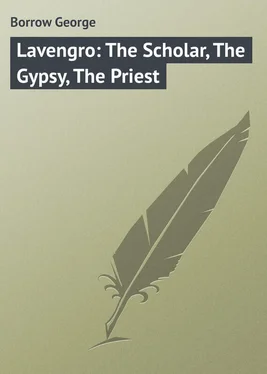George Borrow - Lavengro - The Scholar, The Gypsy, The Priest
Здесь есть возможность читать онлайн «George Borrow - Lavengro - The Scholar, The Gypsy, The Priest» — ознакомительный отрывок электронной книги совершенно бесплатно, а после прочтения отрывка купить полную версию. В некоторых случаях можно слушать аудио, скачать через торрент в формате fb2 и присутствует краткое содержание. Жанр: foreign_prose, на английском языке. Описание произведения, (предисловие) а так же отзывы посетителей доступны на портале библиотеки ЛибКат.
- Название:Lavengro: The Scholar, The Gypsy, The Priest
- Автор:
- Жанр:
- Год:неизвестен
- ISBN:нет данных
- Рейтинг книги:5 / 5. Голосов: 1
-
Избранное:Добавить в избранное
- Отзывы:
-
Ваша оценка:
- 100
- 1
- 2
- 3
- 4
- 5
Lavengro: The Scholar, The Gypsy, The Priest: краткое содержание, описание и аннотация
Предлагаем к чтению аннотацию, описание, краткое содержание или предисловие (зависит от того, что написал сам автор книги «Lavengro: The Scholar, The Gypsy, The Priest»). Если вы не нашли необходимую информацию о книге — напишите в комментариях, мы постараемся отыскать её.
Lavengro: The Scholar, The Gypsy, The Priest — читать онлайн ознакомительный отрывок
Ниже представлен текст книги, разбитый по страницам. Система сохранения места последней прочитанной страницы, позволяет с удобством читать онлайн бесплатно книгу «Lavengro: The Scholar, The Gypsy, The Priest», без необходимости каждый раз заново искать на чём Вы остановились. Поставьте закладку, и сможете в любой момент перейти на страницу, на которой закончили чтение.
Интервал:
Закладка:
A more respectable-looking individual was never seen; he really looked what he was, a gentleman of the law – there was nothing of the pettifogger about him: somewhat under the middle size, and somewhat rotund in person, he was always dressed in a full suit of black, never worn long enough to become threadbare. His face was rubicund, and not without keenness; but the most remarkable thing about him was the crown of his head, which was bald, and shone like polished ivory, nothing more white, smooth, and lustrous. Some people have said that he wore false calves, probably because his black silk stockings never exhibited a wrinkle; they might just as well have said that he waddled, because his shoes creaked; for these last, which were always without a speck, and polished as his crown, though of a different hue, did creak, as he walked rather slowly. I cannot say that I ever saw him walk fast.
He had a handsome practice, and might have died a very rich man, much richer than he did, had he not been in the habit of giving rather expensive dinners to certain great people, who gave him nothing in return except their company; I could never discover his reasons for doing so, as he always appeared to me a remarkably quiet man, by nature averse to noise and bustle; but in all dispositions there are anomalies: I have already said that he lived in a handsome house, and I may as well here add that he had a very handsome wife, who both dressed and talked exceedingly well.
So I sat behind the deal desk, engaged in copying documents of various kinds; and in the apartment in which I sat, and in the adjoining ones, there were others, some of whom likewise copied documents, while some were engaged in the yet more difficult task of drawing them up; and some of these, sons of nobody, were paid for the work they did, whilst others, like myself, sons of somebody, paid for being permitted to work, which, as our principal observed, was but reasonable, forasmuch as we not unfrequently utterly spoiled the greater part of the work entrusted to our hands.
There was one part of the day when I generally found myself quite alone, I mean at the hour when the rest went home to their principal meal; I, being the youngest, was left to take care of the premises, to answer the bell, and so forth, till relieved, which was seldom before the expiration of an hour and a half, when I myself went home; this period, however, was anything but disagreeable to me, for it was then that I did what best pleased me, and, leaving off copying the documents, I sometimes indulged in a fit of musing, my chin resting on both my hands, and my elbows planted on the desk; or, opening the desk aforesaid, I would take out one of the books contained within it, and the book which I took out was almost invariably, not Blackstone, but Ab Gwilym.
Ah, that Ab Gwilym! I am much indebted to him, and it were ungrateful on my part not to devote a few lines to him and his songs in this my history. Start not, reader, I am not going to trouble you with a poetical dissertation; no, no; I know my duty too well to introduce anything of the kind; but I, who imagine I know several things, and amongst others the workings of your mind at this moment, have an idea that you are anxious to learn a little, a very little, more about Ab Gwilym than I have hitherto told you, the two or three words that I have dropped having awakened within you a languid kind of curiosity. I have no hesitation in saying that he makes one of the some half-dozen really great poets whose verses, in whatever language they wrote, exist at the present day, and are more or less known. It matters little how I first became acquainted with the writings of this man, and how the short thick volume, stuffed full with his immortal imaginings, first came into my hands. I was studying Welsh, and I fell in with Ab Gwilym by no very strange chance. But, before I say more about Ab Gwilym, I must be permitted – I really must – to say a word or two about the language in which he wrote, that same ‘Sweet Welsh.’ If I remember right, I found the language a difficult one; in mastering it, however, I derived unexpected assistance from what of Irish remained in my head, and I soon found that they were cognate dialects, springing from some old tongue which itself, perhaps, had sprung from one much older. And here I cannot help observing cursorily that I every now and then, whilst studying this Welsh, generally supposed to be the original tongue of Britain, encountered words which, according to the lexicographers, were venerable words highly expressive, showing the wonderful power and originality of the Welsh, in which, however, they were no longer used in common discourse, but were relics, precious relics, of the first speech of Britain, perhaps of the world; with which words, however, I was already well acquainted, and which I had picked up, not in learned books, classic books, and in tongues of old renown, but whilst listening to Mr. Petulengro and Tawno Chikno talking over their everyday affairs in the language of the tents; which circumstance did not fail to give rise to deep reflection in those moments when, planting my elbows on the deal desk, I rested my chin upon my hands. But it is probable that I should have abandoned the pursuit of the Welsh language, after obtaining a very superficial acquaintance with it, had it not been for Ab Gwilym.
A strange songster was that who, pretending to be captivated by every woman he saw, was, in reality, in love with nature alone – wild, beautiful, solitary nature – her mountains and cascades, her forests and streams, her birds, fishes, and wild animals. Go to, Ab Gwilym, with thy pseudo-amatory odes, to Morfydd, or this or that other lady, fair or ugly; little didst thou care for any of them, Dame Nature was thy love, however thou mayest seek to disguise the truth. Yes, yes, send thy love-message to Morfydd, the fair wanton. By whom dost thou send it, I would know? by the salmon forsooth, which haunts the rushing stream! the glorious salmon which bounds and gambols in the flashing water, and whose ways and circumstances thou so well describest – see, there he hurries upwards through the flashing water. Halloo! what a glimpse of glory – but where is Morfydd the while? What, another message to the wife of Bwa Bach? Ay, truly; and by whom? – the wind! the swift wind, the rider of the world, whose course is not to be stayed; who gallops o’er the mountain, and, when he comes to broadest river, asks neither for boat nor ferry; who has described the wind so well – his speed and power? But where is Morfydd? And now thou art awaiting Morfydd, the wanton, the wife of the Bwa Bach; thou art awaiting her beneath the tall trees, amidst the underwood; but she comes not; no Morfydd is there. Quite right, Ab Gwilym; what wantest thou with Morfydd? But another form is nigh at hand, that of red Reynard, who, seated upon his chine at the mouth of his cave, looks very composedly at thee; thou startest, bendest thy bow, thy cross-bow, intending to hit Reynard with the bolt just about the jaw; but the bow breaks, Reynard barks and disappears into his cave, which by thine own account reaches hell – and then thou ravest at the misfortune of thy bow, and the non-appearance of Morfydd, and abusest Reynard. Go to, thou carest neither for thy bow nor for Morfydd, thou merely seekest an opportunity to speak of Reynard; and who has described him like thee? the brute with the sharp shrill cry, the black reverse of melody, whose face sometimes wears a smile like the devil’s in the Evangile. But now thou art actually with Morfydd; yes, she has stolen from the dwelling of the Bwa Bach and has met thee beneath those rocks – she is actually with thee, Ab Gwilym; but she is not long with thee, for a storm comes on, and thunder shatters the rocks – Morfydd flees! Quite right, Ab Gwilym; thou hadst no need of her, a better theme for song is the voice of the Lord – the rock-shatterer – than the frail wife of the Bwa Bach. Go to, Ab Gwilym, thou wast a wiser and a better man than thou wouldst fain have had people believe.
Читать дальшеИнтервал:
Закладка:
Похожие книги на «Lavengro: The Scholar, The Gypsy, The Priest»
Представляем Вашему вниманию похожие книги на «Lavengro: The Scholar, The Gypsy, The Priest» списком для выбора. Мы отобрали схожую по названию и смыслу литературу в надежде предоставить читателям больше вариантов отыскать новые, интересные, ещё непрочитанные произведения.
Обсуждение, отзывы о книге «Lavengro: The Scholar, The Gypsy, The Priest» и просто собственные мнения читателей. Оставьте ваши комментарии, напишите, что Вы думаете о произведении, его смысле или главных героях. Укажите что конкретно понравилось, а что нет, и почему Вы так считаете.












